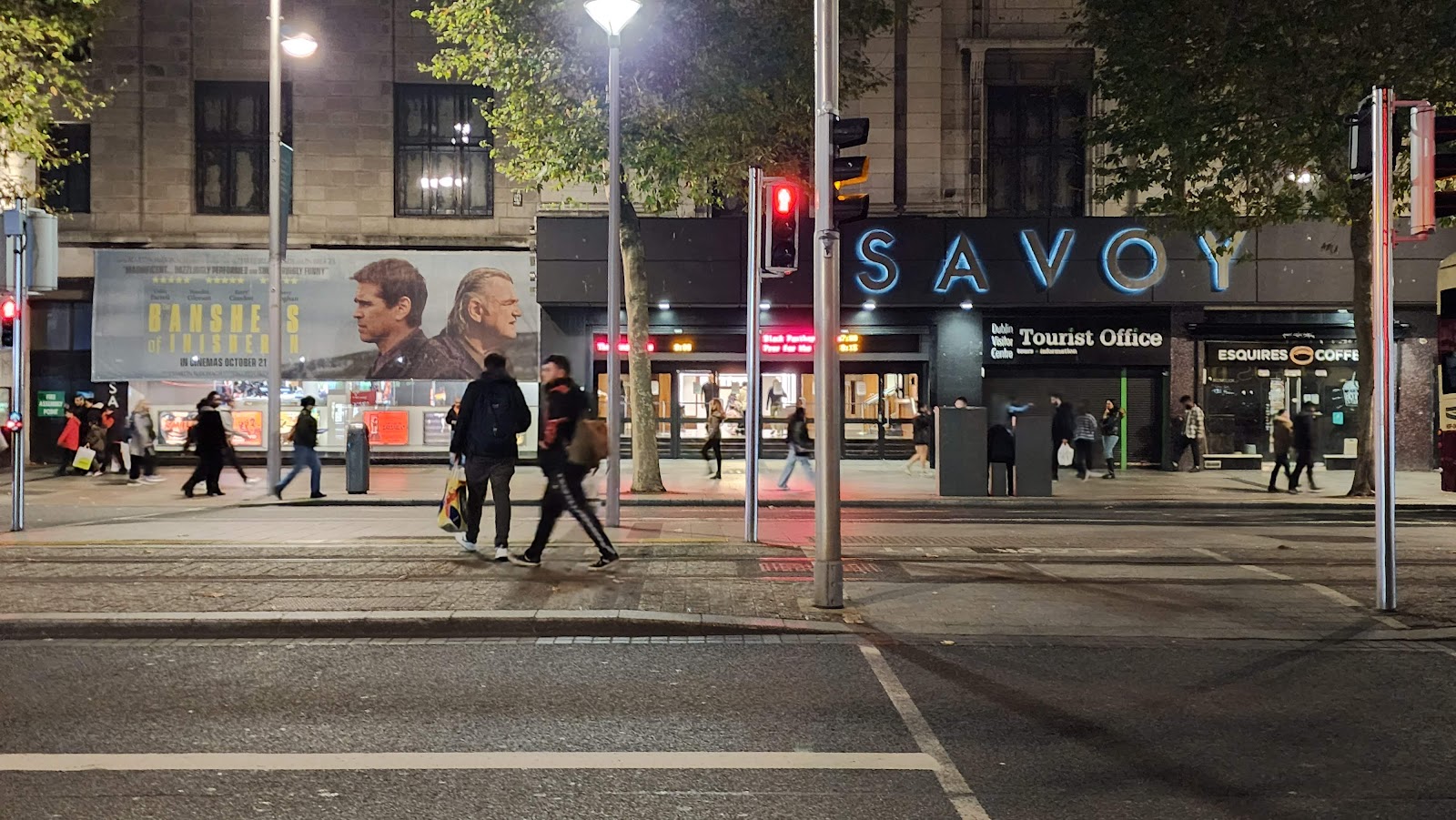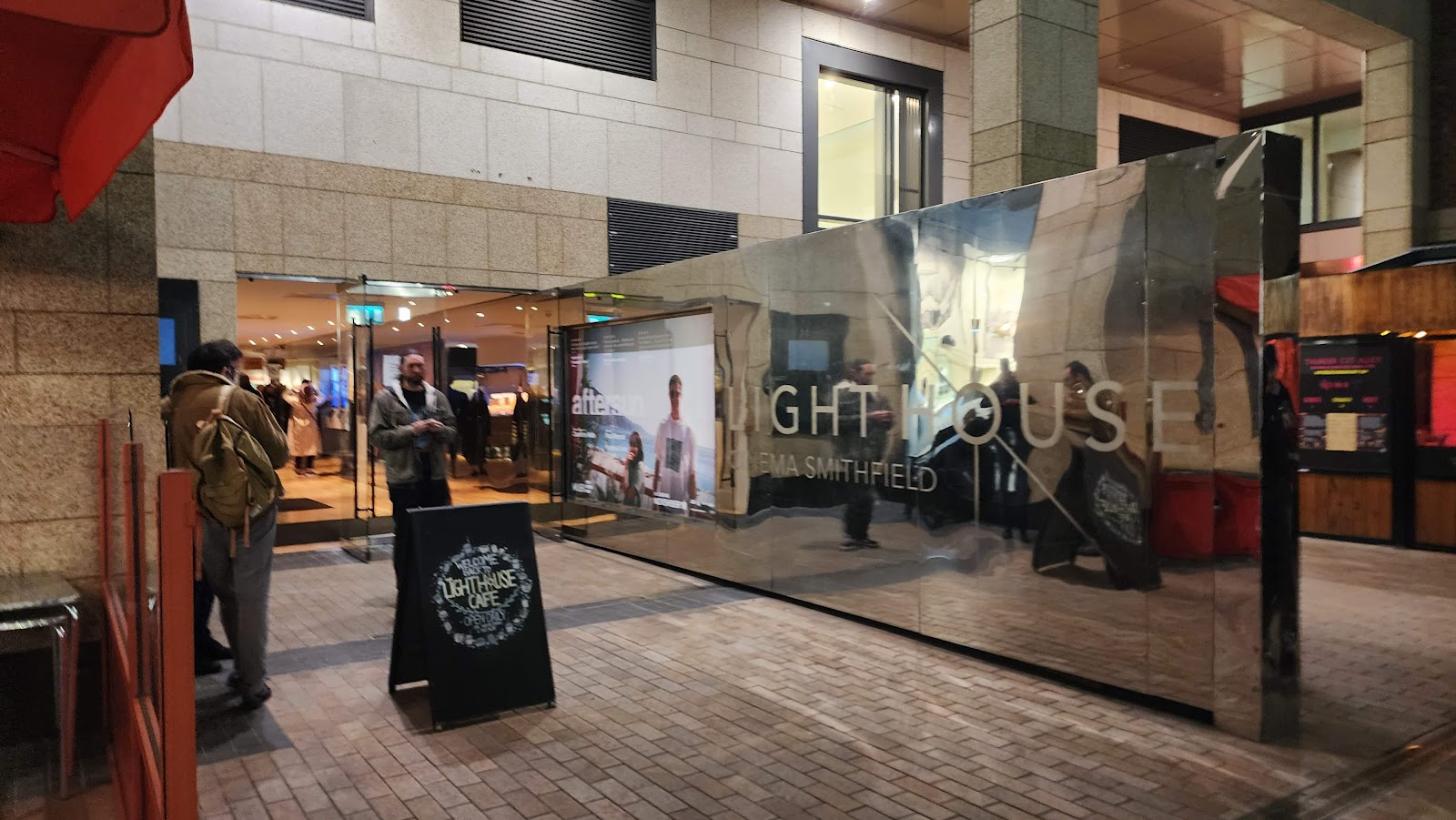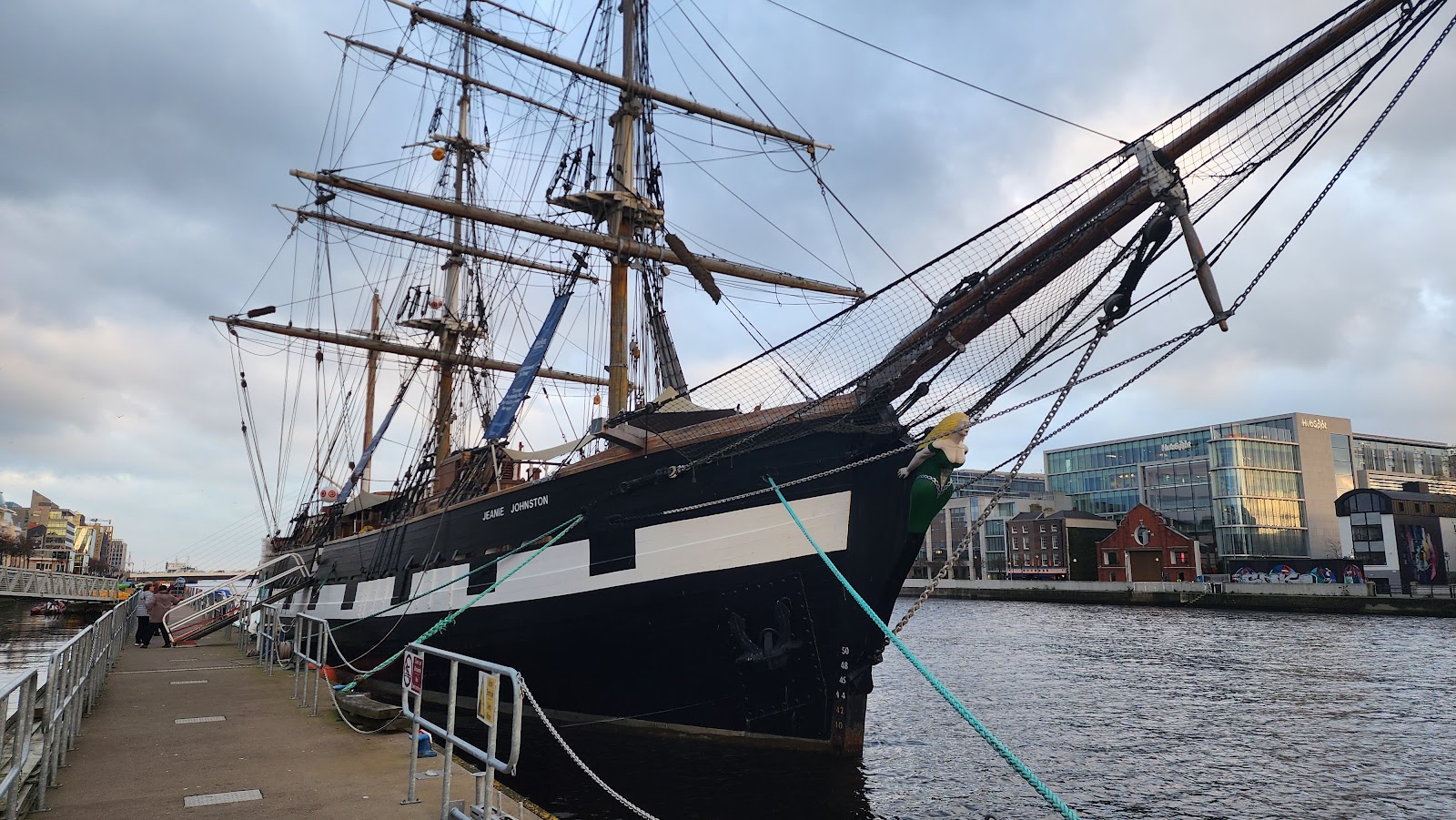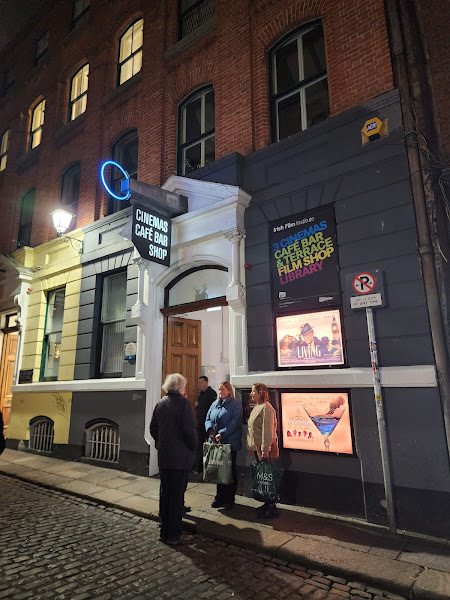Saturday was one of those days when I sort of struggled to remember how I navigated new cities without a smartphone, in part because that navigation was kind of imperfect: For whatever reason, my Galaxy was popping up notes that my location was approximate in the Maps app, and whatever combination of gyroscope and GPS is supposed to calculate which way I was pointing could be off by 90 or 120 degrees. This always seems to happen to me in a new city, and I can't guess why.
The upshot is that while I was walking from the Georgian mansion-cum-tenament house at 14 Henrietta Street to the Irish National Museum of Art and Design, I got turned around a fair bit, so was zooming in and studying the map, and Google probably knows me well enough to highlight theaters at this point. So when I saw "Light House Cinema" and looked up to see this:
… I couldn't help but think, damn, that marquee game is
on point! That is not the marquee, but an observation deck that was probably a smokestack for the power plant which has since been remodeled into a nightclub below at one point. Still, if Light House is a chain, they chose a heck of a location with that landmark across the street from this relatively modest location:
It's actually pretty nice inside, a bit less cramped and segmented than the IFI was, though with the same odd-to-me emphasis on a bar/café at which one can stop and talk before the film as opposed to place to get snacks for during. Probably more appropriate in this case, as I was seeing a movie about someone pointedly
not eating, though I got some popcorn anyway.
As with the IFI, I'm kind of struck by how that entryway is a passage that sort of emphasizes how you're kind of going past the outer edge of the building, into a central area that might have been a courtyard before but is now windowless before you go down to the lower levels. Reasonable enough you don't necessarily want a whole lot of potential light pollution.
At any rate, I'm kind of glad I saw this on the Dublin trip as opposed to at the IFFBoston Fall Focus or its run at the Kendall afterward, if only because visiting places like 14 Henrietta and the like did a nice job of hammering the historical context of the movie home. There's "knowing of the Irish famine" and "having the desperation of it fresh in your mind", after all.
The next day would bring me to the Emigration Museum and the replica
Jeannie Johnston; the former pointed out the extent to which the famine shrunk the country and the latter was actually used as a shooting location:
The guide pointed out, sort of amused, that the production repainted this half of the ship, as that was what would be on camera, and it would be another year before the trust would be able to paint the other to make it symmetric.
The Wonder
* * * ½ (out of four)
Seen 12 November 2022 in Light House Sheffield #3 (first-run, DCP)
The Wonder has an odd sort of framing device which initially made me think of how many people (myself included) initially thought
TÀR was based on a real person, if only because they don't really make films about that sort of singular character unless they actually exist these days; was filmmaker Sebastián Lelio doing something similar but more deliberate, playing with the audience's assumptions about whether this really happened and what segments were necessarily speculative? As it turns out, probably not; by the time the film is over, it's got more interesting thoughts on how stories are told than just reassuring the audience they haven't been fooled.
After that, it sets the scene Rural Ireland, just past the midpoint of the Nineteenth Century. Nurse Elizabeth Wright (Florence Pugh), who had previously tended patients on the battlefields of the Crimea, has been hired for a most unusual job: Spend two weeks observing Anna O'Donnell (Kila Lord Cassidy), who has by all accounts not eaten since her fourteenth birthday, four months ago. She will alternate shifts with Sister Michael (Josie Walker), fittingly, as much of the town committee that hired her, including the local priest (Ciarán Hinds), seek evidence of a miracle, while the local doctor (Toby Jones) hopes for some sort of scientific discovery of how humans can perhaps draw sustenance from the ether. Lib is mostly practical, although she notes that Anna is bright and inquisitive, while her parents are sincere and non-exploitative. That said, Anna is not healthy, and what sort of nurse would allow her patient to starve to death, even if it is happening at an impossibly slow pace?
There is a casual mention of the Irish Potato Famine toward the start of the story, seemingly designed to make the audience discount the scale of the event (Ireland was a nation of 8 million at the start, with a million dying and another million emigrating during the famine, and the population still not recovered 170 years later), perhaps focusing on Lib's own demons. It makes sense; this is the sort of thing one tries not to speak of as opposed to moving forward, but it seeps in through cracks: It explains why Will Byrne (Tom Burke), the reporter sent by a London newspaper to cover the story, is no longer of this place even though he grew up there. As it becomes clear that Anna is choosing not to eat more than not needing to - and that her older brother is gone - the idea of survivor's guilt begins to take center stage, and not just for Anna. The men of God need to find meaning in this; the man of science needs to find a way for it to not happen again. Meanwhile, the full plates placed in front of Lib at the inn where she is staying begin to look downright vulgar as the film passes its midpoint. Co-writer/director Sebastián Lelio and company may not be able to evoke the actual hunger of the famine, but they can perhaps simulate
remembering it, and knowing that it will leave its mark upon one forever.
It's such a raw and obvious scar that the audience may figure out what is happening before Lib does, but that serves to bring the film back to where it started and the idea of just what to do with what she's found. The truth, after all, is not going to support the narratives that Anna and the people in her orbit are committed to. Lib is practical, and more rigorous in her science than the doctor who sees her as more instrument than peer, but human minds are often too committed to the world being fair by their own lights, and if Lib is to save Anna, the solution must serve the narratives - including hers. The importance of this makes Niamh Algar's Kitty O'Donnell (Anna's aunt or cousin) an intriguing choice of narrator; despite being as close to things as anybody is, she's so peripheral as to be able to smash the fourth wall without it affecting the story. She pores over Will's stories with difficulty, as she is not quite so well-educated as him or Lib, but both within and outside the story, she's looking to supply context and help everyone - Lib, the viewer, herself - understand the whole situation, including where one can't really know, but has to fill in bits for oneself.
She's nevertheless off to the side for the most part, with Florence Pugh front and center, terrific as always. Lib is a mostly-functional addict, and the way that Pugh captures that not quite being segregated from her work as much as she'd like, especially as the film goes on and the stress of the assignment begins to wear on her. She establishes this aura of being wryly no-nonsense that stabilizes the film when she starts to lose control. It's reflected in Kila Lord Cassidy's Anna, a curious but not precocious kid who has this other layer to her experience even beyond the memory of the famine, and there's something blistering true about how she, in particular, needs a version of this story that makes sense.
That is, ultimately, what makes
The Wonder fascinating beyond what's the main story - it's about how truth gets built, without ever being cynical about whether what actually happened is important.










